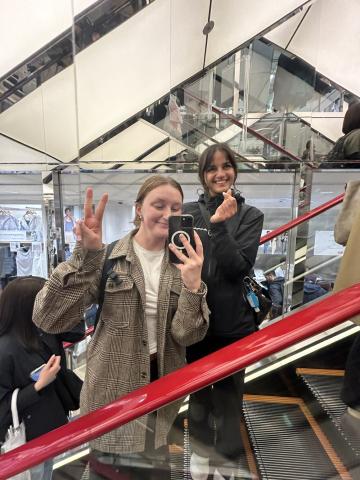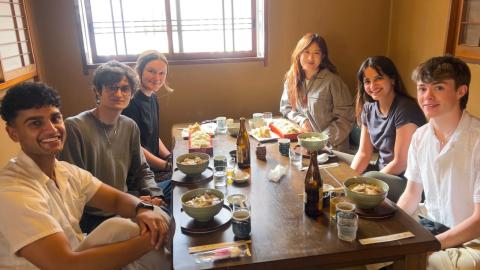When I moved to Japan for my spring term, the extent of my language proficiency was 72 “days” of Duolingo Japanese. I was ready to take on language exchange, excited by the prospect of leaving with a solid, beginner-level Japanese skillset. However, I have lived here for a month now and my Japanese skill remains the same as when I arrived - maybe even worse because I stopped using Duo.
Image
There are probably a few reasons why I haven’t learned any Japanese. It’s likely because Tokyo is an international hub with a lot of English translation. Or, maybe it’s because I’ve socially settled into my “English bubble” and am hesitant to push myself outside of this comfort zone. It might be because Google Translate is adequate enough and easier than awkward, anxiety-inducing interactions with non English speaking locals. To my surprise, it could be the versatility of the word “sumimasen;” the word translates to “excuse me,” but it can basically mean anything if you just change your voice inflection or tone a little. Most likely, it’s a combination of all of these and probably others. Whatever the reason may be, I haven’t learned any Japanese.
Now, I could sit here and write about my regrets from not learning Japanese during my time here. But, to be honest, I have really enjoyed embracing the challenge of navigating a country without knowledge of the national language.
Being unable to read signs in the train station or understand the voice coming from the intercom speaker has forced me to practice being more observant. Instead of relying on signs or verbal guidance, I find myself watching the actions and expressions of others, identifying social patterns or cues to guide me. By increasing my attentiveness, I notice little beauties I otherwise might have missed, such as the line out the door of a good ramen restaurant (I’ll try to remember that name), or the little girl with big, curious eyes sitting next to me on the train (she keeps looking at me, maybe I should say hi?).
Image
I also love exploring how communication is not restricted to verbal conversation. I attended Tokyo Rainbow Pride earlier this month and was stunned by how large of an event it was; millions of people from around the world came to celebrate. And although I didn’t speak to many other attendees because of how crowded the event was, I left feeling more connected to my community than ever before. I remember thinking, wow, here I am in the largest city in the world surrounded by thousands of different backgrounds and languages, yet totally connected. I couldn’t stop smiling as I weaved through the crowds, waving my rainbow flag as if I was saying “hello!” to all the other smiles and rainbow flags waving back at me. The language barriers didn’t matter because we all shared one language which was Pride.
Since coming to Japan, I have been asked countless times why I chose to study abroad here. I’ve tweaked and pivoted my answer in a multitude of ways, but it seems to now settle at simply “I just wanted something new.” I like this answer because, since landing in Japan, there has been something new for me everyday from new food to self reflections. I am navigating life as a minority in more ways than I ever have before. I am learning to be more observant and attentive. And, I am exploring the infinite ways to communicate with a language barrier. I can’t want to see what new adventures and teachings Japan still has in store for me (and if I’ll ever start picking up any Japanese!)
By Zoe Tomlinson, Diverse Ducks Ambassador
GlobalWorks Internship in Tokyo, Spring 2024
